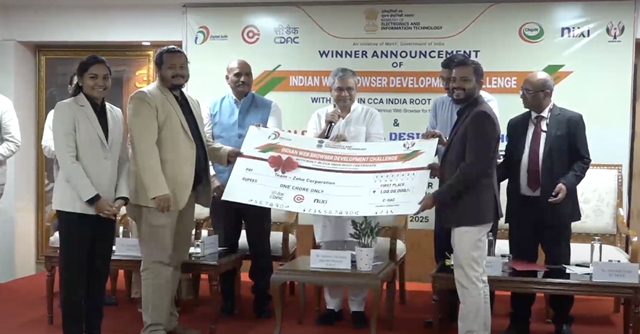
Explained: A bid to develop an indigenous web browser for India


Software-as-a-Service (SaaS) firm Zoho won the Indian Web Browser Development Challenge under the Central government’s 'Aatmanirbhar Bharat' initiative. The organisers — the Ministry of Electronics and Information Technology (MeitY), Controller of Certifying Authorities (CCA), and Centre for Development of Advanced Computing (C-DAC) — awarded Zoho with prize money of ₹1 crore in an event held on March 20.
MeitY called this challenge of building an indigenous web browser as a step towards self-reliance, aimed at fostering innovation and bolstering digital independence. The challenge was initiated in August 2023 and had a three-stage evaluation process including ideation, prototype, and productisation. More than 400 entities participated in the challenge.
Critical features
The challenge required designing the browser with a spectrum of critical features, including a dedicated trust store with CCA India Root certificate, Digital Signing within the browser, Child-friendly browsing, Parental Controls, seamless compatibility with all official Indian languages, Web3 support, and cutting-edge browser capabilities.

Zoho said that its Ulaa stood out for features like CCA Root integration, digital signing, and machine learning-based phishing detection. Ulaa claims to have a ‘robust ad-blocking system and customisable protection settings for a better online experience’ along with a 24-hour security patch policy and multi-lingual support.
“Ulaa redefines browsing by treating privacy as a fundamental right, not a business model — ensuring it remains free for all individuals while never monetising user data. On the enterprise front, Ulaa Enterprise empowers businesses with advanced security, productivity, and visibility tools that protect sensitive information and minimise risks,” Mani Vembu, CEO, Zoho further added.
Beyond Zoho, Team PING — a startup was announced first runner-up followed by Team Ajna. They were awarded ₹75 lakh and ₹50 lakh, respectively.

In a statement, Ajna’s founder Vinay Singh said that a home-grown browser will ensure Indian users have access to crucial services even in cases where global providers block their offerings in the country.
“International browsers often overlook requests from Indian authorities to ban certain sites. In response to this, developing our own Indian-made browser would not only ensure better alignment with local laws and guidelines but also guarantee support from Indian authorities. Furthermore, in any situation, if global tech giants, like Google block Indian users from accessing their services, having a self-reliant, locally developed browser would make us independent and resilient in the digital space.”
What comes next?
MeitY has said that an indigenous Indian browser offers several key advantages. It strengthens data security by ensuring that user information remains within the country, providing better control over sensitive data. It also aligns with India’s Data Protection Act, guaranteeing privacy and adherence to strict security standards. The focus of India’s IT sector, which generates over $282 billion in revenue, is shifting towards creating indigenous hardware and software products, MeitY’s statement noted.

Speaking to participants, IT Minister Ashwini Vaishnaw emphasised that developing India’s own web browser is a crucial milestone in building a comprehensive Indian digital ecosystem, marking the first step toward an independent Indian digital stack. He also reiterated the vision of the government in transforming India from being a "service nation" to a "product nation" with local digital solutions. That said, the ministry has not laid a specific roadmap for integrating such an indigenous browser.
One of the highlights of the challenge was the browser having an inbuilt CCA India root certificate. To be sure, The Root Certifying Authority of India (RCAI), under the CCA, is responsible for issuing and verifying digital certificates in India. Digital certificates are electronic credentials that verify the identity of individuals, websites, or organisations online.
Notably, in 2014, a security breach allowed the National Informatics Commission to generate fake SSL certificates (digital certificates). This led popular browsers to remove trust in NIC’s certificates and later stopped including CCA India root certificates in their trusted root stores. This meant that websites using SSL/TLS certificates from Indian CAs were no longer trusted by default in these browsers.
Do other countries have indigenous browsers?

India is not the first one to work on such initiatives. Several countries have developed indigenous web browsers to strengthen digital sovereignty, security, and data privacy.
China has Chromium-based 360 Secure Browser, designed to comply with national cybersecurity policies. Russia promotes a freeware web browser called Yandex, optimised for local services and regulations. South Korea developed Whale Browser by Naver, catering to regional needs and security standards. These browsers help governments reduce reliance on foreign technology, safeguard user data, and maintain control over digital ecosystems. As cyber threats increase, more nations are investing in homegrown browsers for online security.
